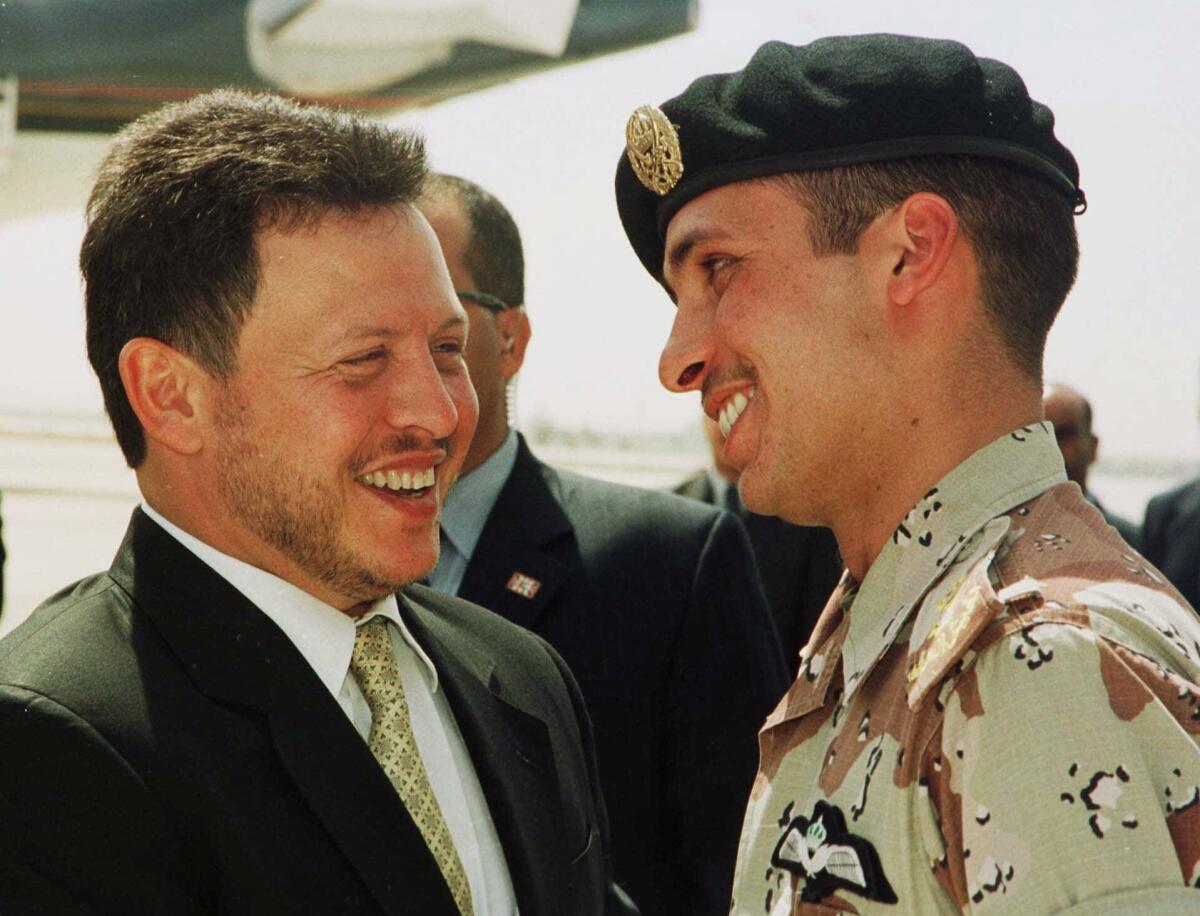Estranged prince signs letter declaring fealty to Jordan’s King Abdullah

- Share via
AMMAN, JORDAN — Jordan’s former crown prince said Monday that he would place himself in the hands of King Abdullah II and rally behind him as the country’s leader, a reversal from his recent withering diatribes.
Jordan has been in the thrall of palace intrigue since the government announced it had thwarted “sinful plans” to destabilize the country involving outside groups and Prince Hamzah bin Hussein, one-time crown prince and half brother to Abdullah.
Authorities placed the prince under house arrest and rounded up at least 16 of his associates, including another relative of the royal family and a number of officials.
In a statement issued by the royal court Monday night and signed by the prince, Hamzah said he would adhere to the kingdom’s constitution and affirmed his support to his half brother.
“The interests of the nation must be above all consideration, and we must all stand behind his majesty the king, in his efforts to protect Jordan and its national interests,” said the statement. “In light of the developments of the last two days, I place myself in the hands of his majesty the king.”
The statement, which bore the handwritten words “at my uncle’s house his royal highness Prince Hassan,” ended with a verse from the Quran related to obeying “those in authority among you.”
Hours before, Abdullah tasked Hassan, paternal uncle to both royals, to “deal with the issue of” Hamzah, who in turn “confirmed his commitment to the approach” of Jordan’s ruling Hashemite family, according to a statement issued by the palace. Four other princes joined Hassan in the mediation effort, including Hamzah’s brother, Hashem.
The conciliatory words came in counterpoint to the prince’s fiery rhetoric from Saturday, when he excoriated his half brother in two leaked videos for the country becoming “stymied in corruption, nepotism and misrule.”
“I’m not the person responsible for the breakdown in governance, for the corruption, and for the incompetence that has been prevalent in our governing structure for the last 15 to 20 years, and has been getting worse by the year,” he said.
“I’m not responsible for the lack of faith that people have in their institutions. They are responsible,” he said, in an oblique reference to the king and his government.
He added that, contrary to what his accusers were sure to allege, he was not involved in any foreign plot and was instead speaking out against corruption and the inability to dissent.
Hamzah leaked the videos through his lawyer, who then gave them to the BBC. Speaking in English and Arabic, the prince says most of his communications had been cut off and his armed guard withdrawn after a visit to his home by the army’s chief of staff, Maj. Gen. Yousef Huneiti, who asked him to stop all “movements and activities that were being employed to target Jordan’s security and stability.”
In an audio message released on social media Monday and recorded after the army chief’s visit two days prior, the prince says Huneiti had threatened him but that he would defy his injunctions. The voice in the recording matches that of the prince.
“I’m now waiting to see what they will do. I don’t want to mobilize because I don’t want to escalate now, but for sure I won’t adhere when they say ‘you can’t go out, you can’t tweet, you can’t communicate with people and you’re only allowed to see the family,’” Hamzah says in the recording.
“For a chief of staff to come tell you these words, I think that this is not acceptable in any way.”
On Sunday, Jordan’s Foreign Minister Ayman Safadi said the prince was at the center of a plot to destabilize the kingdom. Also accused were Bassem Awadallah, a former confidant to Abdullah who had occupied several high-ranking roles in government; and Sharif Hassan bin Zaid, a relative of the royal family who succeeded Awadallah as special envoy to Saudi Arabia.
Safadi did not provide any particulars on the plot but said foreign entities as well as members of the Jordanian opposition abroad were involved. The investigation was ongoing, he said. There was no mention of the word “coup.”
The royal family’s fracas has upended the stability that Jordan has long touted as an achievement in a difficult part of the world. The kingdom, which is mostly desert and has few resources to sustain its 10 million people, has for decades relied on its strategic location and the largesse of its allies; that includes the U.S., which counts Jordan as one of its top counter-terrorism partners in the region. Jordan borders Israel, the West Bank, Syria, Iraq and Saudi Arabia.
Washington quickly came out in support of Abdullah, adding its voice among regional countries backing any move the monarch took to maintain Jordan’s stability and security.
Before he died in 1999, King Hussein, father to both Abdullah and Hamzah, appointed the former as monarch and the latter as crown prince.
At the time, Hussein’s move was seen as a wise one, with Abdullah able to take the country past its recent divisions, while Hamzah — who bears a strong resemblance to his father — maintained relations with the tribal leaders that were the monarchy’s power base.
But Abdullah removed Hamzah from the role in 2004 and handed it to his own son, also named Hussein.
The public airing of grievances has surprised Jordanians unused to the royal drama seen in neighboring countries. Although the situation had reached a denouement, said Bessma Momani, a professor of international relations at Waterloo University in Ontario, the fight had caused some damage to the monarchy’s image.
“They created an internal division in the country,” she said in reference to the two royal figures. “Had they been able to manage this quietly, they would have done a better service to everyone.”
More to Read
Sign up for Essential California
The most important California stories and recommendations in your inbox every morning.
You may occasionally receive promotional content from the Los Angeles Times.











